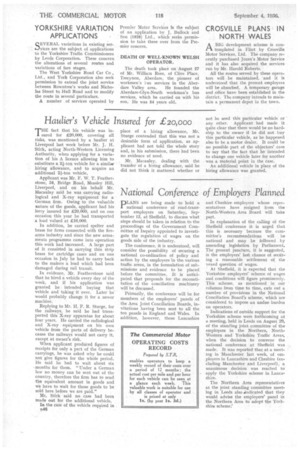Haulier's Vehicle Insured for £20,000 T HE fact that his vehicle
Page 60

If you've noticed an error in this article please click here to report it so we can fix it.
was insured for £20,000, covering all risks, was mentioned by a haulier at Liverpool last week before Mr. J. H. Stirk, acting North-Western Licensing Authority, when applying for a variation of his A licence allowing him to substitute a 21-ton vehicle for a similar hiring allowance, and to acquire an additional 21-ton vehicle.
Applicant was Mr. F. W. T. Featherstone, $4, Bridge Road, Mossley Hill, Liverpool, and on his behalf Mr. Macaulay said he was carrying radiological and X-ray equipment for a German firm. Owing to the valuable nature of the goods, applicant had his lorry insured for £20,000, and on one occasion this year he had transported a load valued at £16.000.
In addition, he carried spelter and brass for firms connected with the firearms industry and since the new armaments programme came into operation this work had increased. A large part of it consisted in carrying thin strip brass for cartridge cases and on one occasion in July he had to carry back to the makers a load which had been damaged during rail transit.
In evidence, Mr. Featherstone said that he hired a vehicle every day of the week, and if his application was granted he intended buying that vehicle and taking it over. Later he would probably change it for a newer machine.
Replying to Mr. H. F. R. Sturge, for the railways, he said he had transported this X-ray apparatus for about four years. He carried the radiological and X-ray equipment on his own vehicle from the ports of delivery because the railways would not carry it, except at owner's risk.
When applicant produced figures of receipts for only a part of the German carryings, he was asked why hecould not give figures for the whole period. He said he had to wait about six • months for them. "Under a German law no money can be sent out of the country, therefore the firm has to send the equivalent amount in goods and we have to wait for those goods to be sold here before we are paid." Mr. Stirk said no case had been made out for the additional vehicle. In the case of the vehicle required in place of a hiring allowance, Mr. Sturge contended that this was not a desirable form of application, as applicant had not told the whole story and, in his submission, there had been no evidence of need.
Mr. Macaulay, dealing with the transfer of a hiring allowance, said he did not think it mattered whether or
not he used this particular vehicle or any other, Applicant had made it quite clear that there would be no hardship to the owner if he did not buy this particular vehicle, as he happened also to be a motor dealer. It could be no possible part of the objectors' case to say that the fact that he intended to change one vehicle later for another was a material point in the case.
An additional vehicle in place of the hiring allowance was granted.




























































































